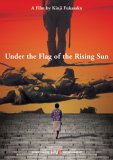| Reviews & Columns |
|
Reviews DVD TV on DVD Blu-ray 4K UHD International DVDs In Theaters Reviews by Studio Video Games Features Collector Series DVDs Easter Egg Database Interviews DVD Talk Radio Feature Articles Columns Anime Talk DVD Savant Horror DVDs The M.O.D. Squad Art House HD Talk Silent DVD
|
DVD Talk Forum |
|
|
| Resources |
|
DVD Price Search Customer Service #'s RCE Info Links |
|
Columns
|
|
|
Under the Flag of the Rising Sun
It wasn't until near the end of his life and career that Japanese filmmaker Kinji Fukasaku really came to the attention of American audiences. In 2000, his final film, Battle Royale exploded on the screen, serving notice to audiences in the states that a bold, innovative director had arrived. The only problem was that Fukasaku had already made nearly sixty films in a career that spanned five decades, and sadly, Battle Royale was to be the final masterpiece in a long list of masterpieces. Thankfully, some of Fukasaku's best work is finally being released on DVD here in the United States, including such classics as Street Mobster and Battles Without Honor and Humanity. Perhaps the filmmaker's best and most personal film, Under the Flag of the Rising Sun, has finally arrived in the States. And if you were to only watch and own one Fukasaku film – as a hard a decision as that may be – it would have to be this film.
Sachiko Hidari stars as the widow of Togashi (Tetsuro Tamba), a soldier executed at the end of World War II for desertion. Hidari can not accept the fact that her husband was a deserter, and twenty-six years after the war, she is still looking for the reason behind her husband's execution, and looking to restore honor to his name so he may rest in peace. Year after year the lonely widow returns in vein to the Ministry of Welfare, hoping to clear her husband's name. Finally, she is given four names of other soldiers who may know why her husband was killed. Hidari tracks down the four witnesses, but their stories all conflict, resulting in a mystery akin to Akira Kurosawa's classic Rashomon. One veteran remembers Togashi dying as a hero in combat, another believes he was executed for stealing potatoes, one recalls he being killed for murdering a superior officer, and one recounts a tale of soldier driven to cannibalism. Each story she hears reveals the horrors of the war, but does nothing to bring comfort or closure to what happened to her husband.
Fukasaku was a teenager during World War II, and one of his jobs was removing dead bodies. At a very early age he saw first-hand the brutality of war, and developed a cynical distrust for authority and adults – an attitude that carried through to all of his films. Fukasaku uses this film as an expression of the dehumanizing effect war has, and the horrific futility of combat. Adapting Shoji Yuki's non-fiction book into a fictional film, Fukasaku does an amazing job of using each flashback sequence as an opportunity to reveal ugly truths about Japan's involvement in World War II. At the same time, he uses the present as an opportunity to explore post-war Japan, as the widow encounters people who would rather forget what happened, and veterans who wish they had never survived the war.
Under the Flag of the Rising Sun is not only Fukasaku's best work, it is one of the most compelling anti-war films ever made. Other films have done wonderful jobs of showing the horrors and futility of war, and films like Born on the Fourth of July, and Jean-Pierre Jeunet's A Very Long Engagement (which borrows heavily from this film) are excellent examinations of post-war life. But few films capture as much as this one.
Much of what fuels Under the Flag of the Rising Sun is the sustained passion Hidari has for her husband. In that regard, the film, much like A Very Long Engagement, is a love story. Fukasaku uses Hidari's undying love as a foundation to give the film a sense of humanity, which in turn elevates it above the standard war film. As an audience, we care about what happened to Togashi because his widow cares so much.
Video:
Either Home Vision Entertainment is the best company in the business when it comes to video transfers, or they are working from the best sources imaginable (or maybe a bit of both). Once again, as with all their other Fukasaku releases, HVE has given us a beautiful transfer presented in 2.35:1 widescreen, with vibrant colors and high-contrast black and white that looks pristine.
Audio:
Under the Flag of the Rising Sun is presented monoaural with the original Japanese language track and English subtitles.
Extras:
Under the Flag of the Rising Sun features a grief interview with Fukasaku scholar Yamane Sadao, who appears on several of the other HVE releases. There is an audio commentary by subtitler Linda Hoaglund. At first you might think a commentary track by the person who did the subtitles is a waste of time. But Hoaglund is a Japanese historian, and her commentary, while being a bit sparse at times, provides an excellent historical context for the film. She also reads several quotes from Fukasaku, which helps to give greater insight into the man and his films.
David Walker is the creator of BadAzz MoFo, a nationally published film critic, and the Writer/Director of Black Santa's Revenge with Ken Foree now on DVD [Buy it now]
|
| Popular Reviews |
| Sponsored Links |
|
|
| Sponsored Links |
|
|
| Release List | Reviews | Shop | Newsletter | Forum | DVD Giveaways | Blu-Ray | Advertise |
|
Copyright 2024 DVDTalk.com All Rights Reserved. Legal Info, Privacy Policy, Terms of Use,
Manage Preferences,
Your Privacy Choices | |||||||













